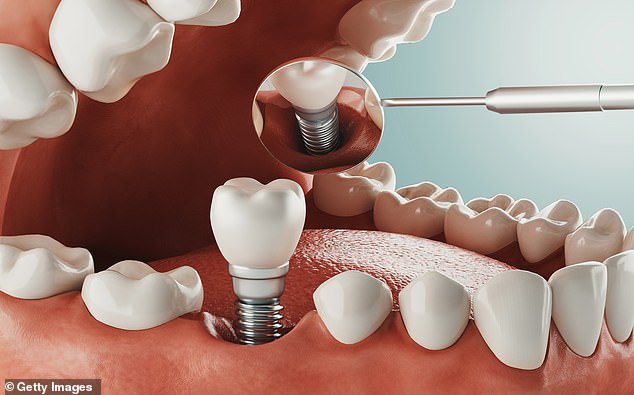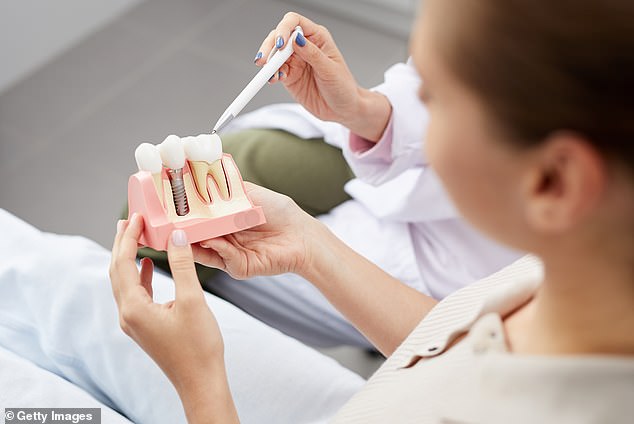Officials warn THOUSANDS have been hit by new dental scams




Thousands of people have been scammed out of hundreds of thousands of dollars by dentists who recommend unnecessary dental procedures.
Patients seeking advice from their dentist for crooked, chipped or discolored teeth may be told by disingenuous doctors that they need extensive replacement implants.
This could cost them up to $65,000 for teeth that could potentially have been saved with more routine – and affordable – procedures such as root canals or fillings.
Oral surgeons have described the trend of recommending unnecessary dental work as a ‘horror show’ and report seeing five or more clients every month seeking second opinions.
However, the providers who tell patients to pull and replace their teeth have a significant financial incentive. Insurance typically does not cover implants, and dentists can earn tens of thousands of dollars per patient.
And with a shortage of qualified oral surgeons in thousands of clinics across the US, a large portion of doctors performing unnecessary procedures are not adequately trained to perform them properly.
Implant surgery involves removing teeth and replacing them with a metal post anchored into the jaw. The post is then covered with a prosthetic tooth, often a porcelain crown.
For those requiring more extensive replacements, options such as ‘full arch’ or ‘All-on-4’ implants allow for the replacement of the entire top or bottom row of teeth, or, in more extensive cases, the replacement of all 32 teeth of a patient.

Implant surgery involves removing a single tooth and replacing it with a metal post anchored into the jaw. The post is then covered with a prosthetic tooth, often a porcelain crown

Implanted teeth can become infected, but many people think they are infallible. According to dentists, this is a misconception
In ten interviews with KFF and CBS, dentists and surgeons with expertise in implants said they had given second opinions to patients who had previously been told they needed implants.
However, the dentists said they ultimately concluded implants were not necessary.
Each dental specialist said they had seen many patients who had been recommended for full arch implants by other dentists, despite their teeth being treatable with conventional dentistry.
Becky Carroll of New Jersey was hoping to undergo an upper full arch procedure that would replace 16 teeth.
The 52-year-old was missing some teeth and others were stained.
She smiled with her mouth closed, embarrassed by her faint smile, and was told that the only way to improve her smile was to use implants.
She saved and borrowed $31,000 for a procedure to implant new artificial teeth at a ClearChoice Dental Implant Center in New Jersey in 2021 after seeing an ad promoting getting a brand new smile in just one day.
But her procedure was the start of a years-long journey to fix the failed implants. KFF Health News and CBS reporting revealed.
Ms. Carroll woke up during her procedure and felt all the pain that comes with having screws drilled into your jaw and cheekbones.
When the procedure was over, Carroll’s prosthetic teeth were so misaligned that she was unable to chew for more than two years until she could afford corrective surgery at another clinic, according to an affidavit from her lawsuit against ClearChoice.

Despite their cost, implants have become increasingly popular. Since 2010, turnover has grown by more than six percent annually
She said: ‘I thought implants would be easier, and in one go, so you didn’t have to keep going back to the dentist. But I should have asked more questions… can they save these teeth?’
Thousands of lawsuits have been filed nationwide alleging, like Ms. Carroll’s, that implant patients have experienced painful complications that required expensive, time-consuming and painful corrective surgeries.
Other lawsuits allege that dentists at some implant clinics persuaded, pressured or coerced patients to unnecessarily remove teeth.
William Giannobile, dean of the Harvard School of Dental Medicine, said: ‘There are many cases where teeth are perfectly fine and are removed unnecessarily.
“I really hate to say it, but many of them do it because, from a monetary point of view, these procedures are much more beneficial to the practitioner.”
He had seen “dozens” of patients seeking second opinions after being recommended for unnecessary implants.
He added: ‘I see a lot of these patients now coming in and saying, ‘I’ve been seen and they’re saying I need to have my whole set of teeth – all my teeth – extracted.’ And then I’ll look at them and say we can keep most of your teeth.”
Despite their cost, implants have become increasingly popular. Sales have grown more than six percent annually since 2010, reaching more than 3.7 million implants sold in the U.S. by 2022, according to a 2023 report from iData Research, a healthcare analytics firm.
Although implants have been around for half a century and can be life-changing for people with missing teeth, many see them as a quick fix — a misconception, doctors say.
Paul Rosen, a Pennsylvania periodontist who has worked with implants for more than 30 years, said, “You can’t just have an implant placed and ride off into the sunset.
‘In many cases they need more care than teeth, because they are not teeth.’
Aside from the financial damage from unnecessary implants, the procedure carries a host of risks, including infection of the root around the gums and the bone around the implants.
George Mandelaris, a Chicago periodontist and member of the American Academy of Periodontology Board of Trustees, said, “Just because someone can afford implants doesn’t necessarily mean he or she is a good candidate.
“If an implant has an infection, or if an implant has bone loss, an implant dies much faster than teeth.”




